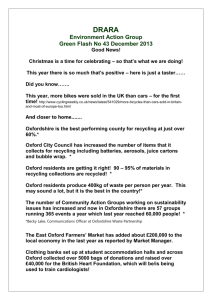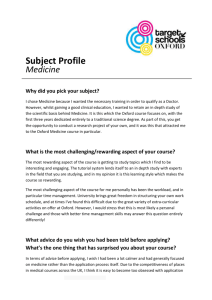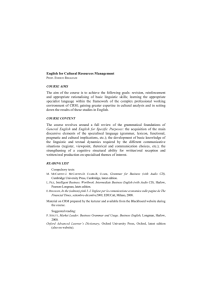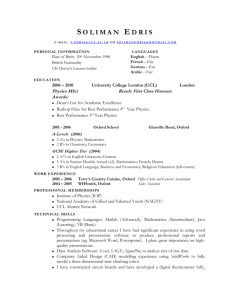Findings from Low Carbon Workshops 2015
advertisement
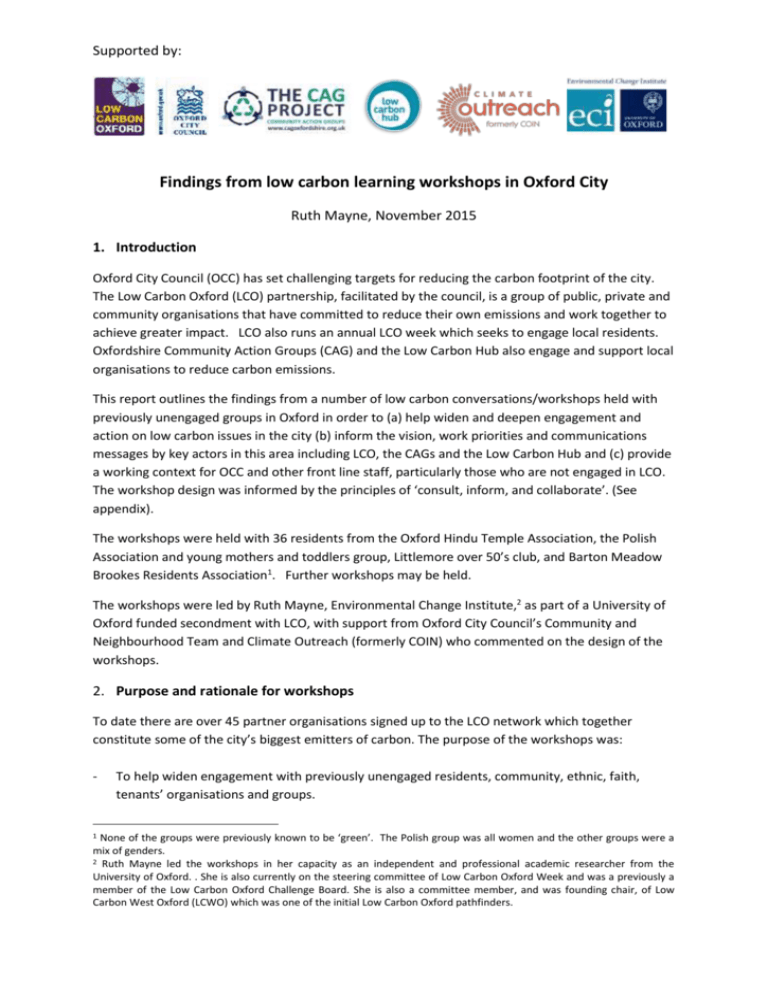
Supported by: Findings from low carbon learning workshops in Oxford City Ruth Mayne, November 2015 1. Introduction Oxford City Council (OCC) has set challenging targets for reducing the carbon footprint of the city. The Low Carbon Oxford (LCO) partnership, facilitated by the council, is a group of public, private and community organisations that have committed to reduce their own emissions and work together to achieve greater impact. LCO also runs an annual LCO week which seeks to engage local residents. Oxfordshire Community Action Groups (CAG) and the Low Carbon Hub also engage and support local organisations to reduce carbon emissions. This report outlines the findings from a number of low carbon conversations/workshops held with previously unengaged groups in Oxford in order to (a) help widen and deepen engagement and action on low carbon issues in the city (b) inform the vision, work priorities and communications messages by key actors in this area including LCO, the CAGs and the Low Carbon Hub and (c) provide a working context for OCC and other front line staff, particularly those who are not engaged in LCO. The workshop design was informed by the principles of ‘consult, inform, and collaborate’. (See appendix). The workshops were held with 36 residents from the Oxford Hindu Temple Association, the Polish Association and young mothers and toddlers group, Littlemore over 50’s club, and Barton Meadow Brookes Residents Association1. Further workshops may be held. The workshops were led by Ruth Mayne, Environmental Change Institute,2 as part of a University of Oxford funded secondment with LCO, with support from Oxford City Council’s Community and Neighbourhood Team and Climate Outreach (formerly COIN) who commented on the design of the workshops. 2. Purpose and rationale for workshops To date there are over 45 partner organisations signed up to the LCO network which together constitute some of the city’s biggest emitters of carbon. The purpose of the workshops was: - 1 To help widen engagement with previously unengaged residents, community, ethnic, faith, tenants’ organisations and groups. None of the groups were previously known to be ‘green’. The Polish group was all women and the other groups were a mix of genders. 2 Ruth Mayne led the workshops in her capacity as an independent and professional academic researcher from the University of Oxford. . She is also currently on the steering committee of Low Carbon Oxford Week and was a previously a member of the Low Carbon Oxford Challenge Board. She is also a committee member, and was founding chair, of Low Carbon West Oxford (LCWO) which was one of the initial Low Carbon Oxford pathfinders. - To provide learning to inform and strengthen future strategy. Contribute to learning about public engagement tools. The rationale for widening engagement with a wider range of organisations is to: - Strengthen carbon impacts – even groups/organisations that emit comparatively low levels of emissions help contribute to LCOs carbon reduction aims. Small reductions when aggregated make a difference and successful carbon reducing ‘innovations’ can be replicated. In addition some groups may have large memberships, the capacity to influence others or may become ‘demanders’ of change in their workplaces or communities. - Help alleviate social problems and reduce inequalities – by widening access to the ‘co-benefits’ of carbon reduction activities such as reduced fuel bills, improved health, access to skills, resources, jobs etc. - Increase the legitimacy of and public support for the city’s carbon reduction targets - by widening consultation, information/resource flows and collaboration. (See appendix 1 for further detail about the rationale for widening engagement) 3. Headline findings and suggestions 3.1 Headline findings The workshops were held with 36 people with 4 groups across the city. While it is not possible to generalise from a sample of this size the findings do offer some valuable insights for local action on climate change: Green spaces, bus links, convenience and the historic/beautiful nature of town figured highly as positive aspects of living in Oxford. Transport/traffic/congestion and inequality were regarded as negative aspects of living in Oxford. The large majority of participants in all 4 groups are concerned about climate change, believe they have a responsibility to take action and consider it a high priority for their group to act on. Participants appeared primarily motivated to act due to altruistic concerns about people and planet, but also recognised the practical co-benefits for themselves and others from carbon reduction activities. Participants ‘voted’ for the following top 5 priorities out of a possible 12 issues for LCO to work on in descending order of importance: (a) an affordable and green public transport system particularly improved bus links (a) more trees and green spaces – joint first (b) warm energy efficient homes with lower fuel bills (c) local shops and markets selling local produce (e) clean locally owned renewable energy. None of the participants thought that Oxford was already a ‘green/environmentally friendly/low carbon’ city (which may in part reflect a lack of information) although it was recognised that ‘it was trying’ to be. In relation to communication and language the workshops showed that residents were happy to discuss climate change and local carbon reduction initiatives. However, ‘clean’, ‘environmentally friendly’ and ‘green’ framings scored more highly than ‘low carbon’ or ‘sustainability’ ones (noone knew what the latter meant). ‘Happiness’ and ‘health’ framings scored highly compared to ‘prosperity’ or ‘wealth’ ones. ‘Prosperity’ framings scored lowly in part because participants in two of the groups (Littlemore and Barton) felt that economic growth is concentrated in the hands of a few, does not trickle down and contributes to the city’s existing problems such as traffic. Participants were keen to attend LCO week events and would consider aligning existing events or creating new ones to coincide with LCO week (if provided with practical support to do so) The groups were interested in joining LCO in principle but some felt the content and language of the charter would need to be changed for residents/community associations as it was difficult to understand and made the point that smaller organisations would also need practical support to help reduce emissions. All 4 groups gave positive feedback on the workshop and expressed interested in follow up activities: 3 of the 4 groups have taken up the offer of a follow up meeting with the Oxfordshire Community Action Group (CAG). One group has already taken action and arranged a meeting with their social landlord to ask it to improve the energy efficiency of the residents’ homes and is following up with OCC about waste issues. One group said it would roll out the LCO Week challenges to its network. All the groups said they would like a return visit from OCC/LCO staff and the researcher to get feedback on the outcomes of the learning workshop. Overall, the findings suggest that workshops such as these can serve as an effective and relatively low cost communication, consultation and engagement tool with previously unengaged groups on climate change (or other) issues. However, translating the groups’ motivations into practical action requires follow up and practical support. This has subsequently been provided by linking the groups to CAG. Resources permitting OCC neighbourhood locality and diversity officers, the LCO Week coordinator and the Hub may also be able to offer further practical support. 3.2 Recommendations - - That key actors – such as LCO, CAG and the Low Carbon Hub - use the workshop findings to inform their vision, communications and work plans. That key actors adapt and use the workshop methodology as tool to widen engagement on low carbon (or other) issues. That OCC considers complementing the learning workshops with a city wide survey to inform the design of the Sustainability Energy Action Plan and to act as a communication and engagement tool. That OCC allocates time for the LCO week coordinator to undertake outreach activities during the year, resources permitting, to enable engage a wider range of organisations. That OCC reviews whether the LCO charter is appropriate for civil society groups, communities, SMEs. Possibilities might include: o - developing a second category of LCO ‘supporters’ which allows smaller organisations; and community groups to make their own bottom-up carbon reducing carbon cutting ‘pledges’; o developing an additional charter tailored to smaller organisations and community groups. That key actors develop shared information resources for use by front line staff from relevant organisations (OCC, CAG, Hub, CAB, health agencies, community groups) that outline both the carbon and co-benefits of carbon reduction activities in relation to home energy, transport, food, waste reduction, lifestyle issues 4. Detailed findings 4.1 Residents’ experiences of Oxford The workshop started with a general contextual discussion during which participants were asked what were the most positive and negative aspects of living in Oxford. All responses were unprompted unless otherwise indicated. Positive aspects of living in Oxford: Green spaces: Participants in all 4 groups said that they valued, appreciated or loved Oxford’s green spaces and parks. As one participant said: ‘I like having a park, its green, the avenue of trees – it’s lovely up there’. Another participant said that green spaces provide ‘fresh air’ and that ‘its development on the green belt I object to. These green spaces will disappear…once you start that then will they creep over’, and also pointed out that building contributed to flooding through run off. Other positive aspects : Participants also cited: the city being well connected by a regular bus service, its convenience e.g. shops and hospital being close, University and college town, diversity, beautiful, interesting history, a lot going on for students and families, near to London, Negative aspects of living in Oxford: Participants were asked ‘what are the main challenges or difficulties you face living in Oxford’. Again all responses were unprompted unless otherwise indicated Transport issues : - Participants in all 4 groups said that traffic and congestion was a big problem for them, and participants in two groups said that air pollution from traffic was a problem . One participant said: ‘There are too many cars in city area. Air pollution is a big problem – 60% of children living on the main road have asthma’. A participant in another group said: I’ve never had asthma before coming to Oxford because of the pollution by cars’. - Participants in one of the groups also said that the noise of traffic was a problem. - Traffic was also cited as a key future problem for Oxford as a city by participants in 2 groups. - Transport links were cited as a problem by participants in the Littlemore and Barton groups noted that the bus service went to the centre but not to other parts of the city such as the station or to other communities. The latter was seen as contributing to communities being ‘parochial, inward looking and geographically cut off from each other’ and a sense of a divided city’. It also makes it difficult for people to commute out of the city for work or to the Cowley works. - Participants in the Polish Association thought that ‘the lack of proper and safe cycle routes’ was a problem. Cold homes and high fuel bills: Participants in the Barton group mentioned that their ‘buildings were made on cheap. All are old stock, have very low insulation, are made of concrete, prefabs, and have enormous fuel bills. The amount of heat that pours out would power a small rocket to the moon’. Participants in other groups only mentioned cold homes and fuel bills when prompted and said that their energy bills were high and their houses were not particularly warm. Inequality : participants in two groups (Barton and Littlemore) said that inequality and a divided city were big problems: ‘There are high salaried people living in nice parts of Oxford, and then dormitory areas like this which were really designed to supply industry with labour but that industry is now automated. So we now have estates with low quality houses and without jobs.’ Other difficulties about living in Oxford cited by participants included: the lack of a community centre (Oxford Hindu Temple and Community Centre) which means the group cannot engage its members to the extent it would like e.g. on climate change), and litter, drugs and the lack of community police officers (Barton) which weakens the community as people stay indoor. 4.2 Concerns about climate change Participants were asked to write down one word that best described how they felt about climate change, and were then asked in what ways climate change might affect them in Oxford. The exercise showed that a large majority of participants in all 4 groups (36 people across 4 workshops) were concerned about climate change. The majority of participants in the four groups thought that climate change would bring more extreme weather events, and that flooding (linked to climate change) was getting worse, although some participants were more informed about the likely impacts than others. A minority of residents in one group were more sceptical about the extent of impacts e.g. ‘There has always been flooding in Oxford’. But despite this felt that action was needed. When asked what the personal effects of more extreme weather might be one participant said ‘Isolation’, ‘health emergencies – and possible power cuts if we don’t start producing more renewables. Older people are more vulnerable than other parts of the community so this community would be at risk’. Participants in all groups appeared to be concerned about climate change mainly for extrinsic reasons e.g. for the planet or their children and grandchildren, but also recognised that there might be potential practical personal benefits from taking action e.g. jobs or warmer homes. 4.3 Responsibility for climate change Participants were asked who was primarily responsible for combatting climate change: The initial reaction from participants in all 4 groups was that ‘We are all responsible’ or ‘Everyone is responsible’. When prompted participants in 3 of the 4 groups also said that government, business and local authority had a greater responsibility and should do more. China and the US were mentioned as big emitters, and the lack of accountability of privatised and increasingly foreign owned business was mentioned by one participant. 4.4 Priority for groups Participants were asked to what extent taking action on climate change would be a priority for their group. Three of the four groups thought that action on climate change would be a priority for their group. The Polish group said it would be a second priority after language and jobs; the Barton group said it would be in the top quarter of issues after poverty, inequality, and exclusion; the Hindu group said it was a high priority for the Oxford Hindu Temple and Community Centre but they would be unable to act on it unless they had a Temple/community centre. The Littlemore group said they would think about it. 4.5 Priority issues for LCO Participants were presented with a poster with a list and images of possible city wide carbon reduction initiatives and were given 5 stickers each and asked to use them to ‘vote’ for 5 issues that they thought OCC/LCO should prioritise to work given that there are limited financial resources. Participants were asked to consider the issue’s contribution to carbon reduction and any practical benefits they might generate for residents. An affordable and green public transport system that reduces traffic and improves air quality (33 votes out of a possible 36 votes). Energy efficient homes which are warmer, healthier and with lower fuel bills (24 votes). More trees to absorb pollution and reduce flooding (23 votes). Local shops and markets that provide fresh, healthy (locally grown) food (15 votes). Participants were keen on having local food or community markets but also recognised the problems. One resident said community markets are ‘worthy and the food is healthier and tastier - but supermarkets have killed local shops so might not happen’. There was also a concern that the prices might be too high for some people. Clean renewable energy to replace polluting coal, and oil, and generate local income. (13 votes). Waste facilities and education to help organisations and individuals to reduce, reuse and recycle. (13 votes). Green jobs and apprenticeships from low carbon businesses and shops. (11 votes). Practical advice and support to help residents live more sustainably and bring the community together (11 votes). Participants emphasised that they wanted practical support e.g. collections for big items, rather than information leaflets. Participants in two of the groups also wanted practical support to help bring the community together. A participant suggested that group workshops would be more effective than individual advice as, ‘It gets people to talk more and then they do more. If you bring people together then they are likely to have better habits and it will be more meaningful’. Green natural and safe places for recreation (10 votes). One participant commented: ‘Public spaces are free and well laid out and safe so Oxford does very well with that’ Safe cycling and pedestrian routes that provide a cheaper, faster and healthier way of getting around. (9 votes). Some of the elderly people were not keen on cycling but 7 of the women in the Polish Association/mother and toddlers group said they would cycle if there were safe pathways. Facilities for electric cars that improve air quality. (7 votes). NB: Some people made the point that ‘More trees’ and ‘Green Spaces’ were the same things. If the scores are added to together it would make it joint first with public transport with 33 votes out of a possible 36 votes. Participants suggested that the following possible work areas were missing: Vegetarianism – as one person in the Oxford Hindu Temple and Community Centre note ‘meat is one of the most important forms of carbon pollution’ and vegetarianism stops people being obese Information Technology – ‘The use of skype can reduce traffic considerably by allowing people to communicate with their families rather than visit them – it can save gallons and gallons of fuel and stops people being isolated. The Council should extend broadband to everyone in the city’. Great Council action to encourage or make businesses educate their workforce and to ‘make residents’ reduce carbon emissions or be more eco-friendly e.g. attend training courses or ‘not pave over their gardens’ School education Local nuclear power stations 4.6 OCC/LCO communication messages Participants were asked to tick which of the following terms they liked best: LCO is a network of local organisations working to make Oxford: A clean city (9 votes out of a possible 36) - when asked to explain what they mean by ‘clean’ one participant explained that it could mean clean air, not just litter. Another participant said: ‘If you want to motivate and mobilise people you have to get their emotional response – that ticks their box, floats their boat and get them out of bed. So if you say ‘clean green city’ most people get a clean, green city, but if you say ‘low carbon’ they go ‘oh it’s that black stuff – what that’s got to do with it’….Oxford City have got it right – a clean, green city is absolutely right ‘. An environmentally friendly city (8 votes) - participants liked this term but in discussion it was recognised that it might reinforce a view that climate change is about the environment rather than about humans as well A green city (6 votes). A low carbon city (3 votes) – when asked why they hadn’t ‘voted’ for this term participants explained that that they thought it was already covered in the name of the network, it was meaningless, it was not precise enough, means different things to different people, or that it doesn’t say what you mean e.g. a clean city. A sustainable city (0 votes) - when asked why they didn’t ‘vote’ for this word participants said that they didn’t know what this term meant, thought it was a passing fashion or simply didn’t like it. One participant suggested that its meaning had been devalued by government. They were then asked to vote on the following additional phrases: and a city in which all its citizens feel happy to live and experience a high quality of life (OSP vision wording) (11 votes) and a healthier city (11 votes) and a fairer city (6 votes) – the term ‘fairer’ was more important to participants in the Littlemore and Barton than the Polish and Hindu associations. They felt that the city was ‘divided and unfair’, that the ‘wealth is concentrated in the hands of a few’ and in ‘North Oxford’, ‘there is no trickle down and communities like this are left to flounder’, ‘that the gap between rich and poor was getting wider all the time which means the poor are getting left behind and standards of living going down’. One person said that the ‘poor are being punished for being poor’. These views were shared by the participants in the 2 groups. and a smart high tech city (wording from LCO charter) (2 votes) and a wealthier, more prosperous city (0 votes) – some participants in Littlemore and Barton said that growth would mean ‘more cars, more ostentatious wealth’ , ‘would only benefit certain parts of the population’, ‘ trickle-down does not work, wealth stays where it is – not here’ and that it ‘will not create jobs that they can do’. Two participants also suggested that growth would be incompatible with tackling climate change as it would mean ‘more carbon emissions’ and another that ‘you can’t have growth indefinitely – it is not sustainable’. 4.7 How ‘green’ is Oxford already Participants were asked how far they thought Oxford was already a green/environmentally friendly or low carbon city. All the participants in 2 groups said ‘no’ and ‘nowhere near’; participants in the 3rd group said ‘it was trying to be, but not there yet’. Participants in the 4th group were not asked due to omission. These responses might in part reflect the fact that these particular groups do not receive information about what actions have already been taken at city level suggesting the need to widen recipients of LCO, Hub and/or the CAG newsletters. Positive indications cited by participants about how the city was trying to reduce its carbon emissions included: aspects of the bus system, the council trying to introduce energy efficient houses and good recycling, waste management and disposal systems. One person suggested that the most important indication of Oxford being ‘green’ would be a better transport policy. 4.8 LCO week events Participants were provided with a representative cross section 12 LCO week events and participants were asked to ‘vote’ with sticky notes for the 3 events that they would actually be likely to attend. The most popular event was the Festival of Nature Wild Fair (35 votes); followed by the Broad Street Fair (28), Oxford Summer Mela (18), Edible Hanging Baskets (17), OxGrow Work Party (12 even elderly people), Clothes swap, mending and scarecrow making session (9), Energise Rose Hill (7 - awkward location for some to get to ), Talks on Climate Change (6), Resistance is Fertile exhibition (4), DIY Bike Repair (3), Ran Kan Kan (2 – low votes partly because of cost), Tandem Festival (0) It was noted in discussion that the ‘votes’ partly reflected where people could get to easily - getting to town was easier than going to another community. 4.9 Feedback on the LCO Charter Participants were asked to provide feedback on the language of the charter and whether or not their group would consider signing up to it in the future. The researcher emphasised that there was no obligation to join and also noted that the charter may undergo a review. In relation to language some participants thought the charter was ‘good’ or ‘worthy’. However, one participant thought the language was ‘inaccessible and gobbledy-gook’. Another said he didn’t understand some of language and said it contained a ‘lot of buzz words’ [such as carbon intensive, good practice, sustainable innovation and strategic partnerships] and needed to be in ‘precise plain English’. The Oxford Hindu Temple and Community Centre said it would be willing to sign up in principle and thought that it would be possible to reduce emissions by 3% pa but needed a community space to do so they could engage people. Participants in the Polish association were daunted by the idea of having to having to reduce carbon emissions by 3% pa. They wondered whether ‘is it possible and asked ‘how would we measure it and how would we report on it’ and ‘how labour intensive would it be’. They also reflected that it ‘would be difficult for a small organisation’. One participant in the Littlemore group suggested that ‘ what can you do as a small organisation is very small compared to what the council can do so it may not make much of a difference for small organisation to sign up’ . A participant also noted that would be ‘difficult to maintain 3% annual reduction for a small organisation over time – there would be very little they could do after initial easy wins, so there needs to be a commitment from larger organisations to help smaller ones. It needs partnership’. The Barton group already received the LCO newsletter and suggested that LCO should ‘make a charter for business and a separate charter for communities with communities’ priorities’. 4.10 Possible action, follow up and collaboration All 4 groups gave positive feedback on the workshop and expressed interested in follow up activities: 3 of the 4 groups have taken up the offer of a follow up meeting with the Oxfordshire Community Action Group (CAG). One group has already taken action as a result of the workshop and arranged a meeting with their social landlord to get them to improve the energy efficiency of the residents’ homes and is following up with OCC about waste issues. One group agreed to would roll out the LCO Week challenges to its network. All the groups said they would like return visit from OCC/LCO staff and the researcher to get feedback on the outcomes of the learning workshop. Table 1: Suggested possible future activities by groups LCO week - Happy that they can link Mela to LCO week. - Could promote LCO week pledge through newsletter Other suggested activities - Kids activities, - Need for outreach and liaison workers to go out to community, rather than asking them to come to you. -Make sure events don’t have propaganda – everyone knows climate change is happening – reasons may be in dispute – but need to have info about is happening and how we can adapt to it. Polish Association and Mothers and Toddler Group Littlemore -Would consider linking their annual summer picnic to LCO week - May consider hosting a low carbon workshop for members in the future. (Would need translators) Would like : -An event like the Rose Hill or the LCO Broad Street fair coming to Littlemore (and to other communities) -Something about global warming for schools e.g. a play -Will consider and discuss in subsequent meetings Barton - JC to visit and discuss - Keen on activities that bring the community together -Interested in possible community markets for food (if price right). Could ask allotment committee - Edible basket making - Looking for a donated water butt, and help with composting - Would be good if they could meet and be inspired from similar groups - Want regular pick up for large items - Following workshop has talked to Social Landlord about improving the energy efficiency of their properties Oxford Hindu Temple and Community Centre Overall, the initial indications from the workshops suggest that the methodology can serve as an effective and relatively low cost communication, consultation and engagement tool with previously unengaged groups. However, translating the groups’ motivations into reductions in carbon emissions requires follow up and practical support. This has been done by linking the groups to CAG. Resources permitting OCC neighbourhood locality and diversity officers, the LCO Week coordinator and the Hub may also be able to offer further practical support. Suggestions from the groups for LCO pathfinders The following suggestions were made during the course of the workshops: More action! e.g. to encourage or ‘make’ residents & businesses do more. Information on climate change impacts and practical actions. Practical support to communities and groups to take action. Connect and engage communities. Improve transport policy. Provide spot checks of insulation installers advertised on OCC’s website. Co-design the city’s carbon reductions strategy/programmes with communities and residents. Measure outcomes not activities. Develop a separate charter for communities and businesses. Appendix 1: Workshop methodology The workshops were held with the following groups that had been identified by staff from the City Council’s Community and Neighbourhood Team neighbourhood team: Name of Group Type of Group Nos of participants Total nos of members Oxford Hindu Temple Association Young mothers and Children’s group. Polish Association The Hands on Social Group Over 50’s residents association, Littlemore Charity 8 men and women Estimated 500 Group. Charity 8 all women 40 Charity 8 men and women 12 Meadow Brook Residents Association, Barton Total Charity 12 men and women 12 36 The two hour workshops were led by the researcher with input from the Community and Neighbourhood team where relevant and were recorded. Discussions were based around a series of semi-structured questions and exercises with follow up prompts and questions where appropriate. In some cases, for example if novel or strong opinions were expressed, the researcher asked whether the rest of the group agreed to get a sense of the degree of consensus. All groups were provided with a ‘thank you’ donation for participating. Appendix 2: Rationale for widening LCO’s engagement The rationale for widening LCO’s engagement to include wider range of civil society groups (e.g. community, ethnic, faith, tenants’ organisations groups and directly with residents through LCO week) is that it could help: a. Strengthen carbon impact by: o Increasing the number and range of organisations/groups reducing their carbon emissions. o Building the capacity of organisations/groups/residents to reduce carbon emissions e.g. by linking them to existing resources and sources of support e.g. relevant OCC and other statutory agencies’ services, Affordable Warmth Network, Citizens Advice Bureau, the Low Carbon Hub, CAG, Good Food Network etc. o Reinforcing behaviour change3 messages to organisations/groups/residents/employees e.g. through the dissemination of the LCO week challenges to a wider number and range of organisations. o Motivating and empowering residents/employees to become ‘demanders’ of change in their communities and workplaces. o Strengthening the design of the city’s carbon reduction strategies by including the perspectives of a more representative range of the city’s organisations and residents. o Contributing to the attainment of other local authority targets e.g. on health, air pollution. b. Help alleviate social problems and reduce inequalities by: o Raising awareness of, and widening access to, national and local policies and resources and the co-benefits of carbon reduction activities. c. Build public support for the Council’s and Governments carbon reduction targets and strategy by: o Widening the reach and spread of low carbon messages to a larger number and increased range of audiences across the city. o Raising organisations/groups/residents/employees awareness of the need for, and benefits of, carbon reduction (environment, health, pocket, jobs, and economy). o Consulting and involving organisations/groups/residents/employees in the co-design of the city’s carbon reduction strategy and hence increasing ownership. 3 One study estimates that approximately half of the energy used in the home depends on the physical characteristics of a house and its equipment, with residents’ behaviour accounting for the rest (Schipper et al., 1989).

